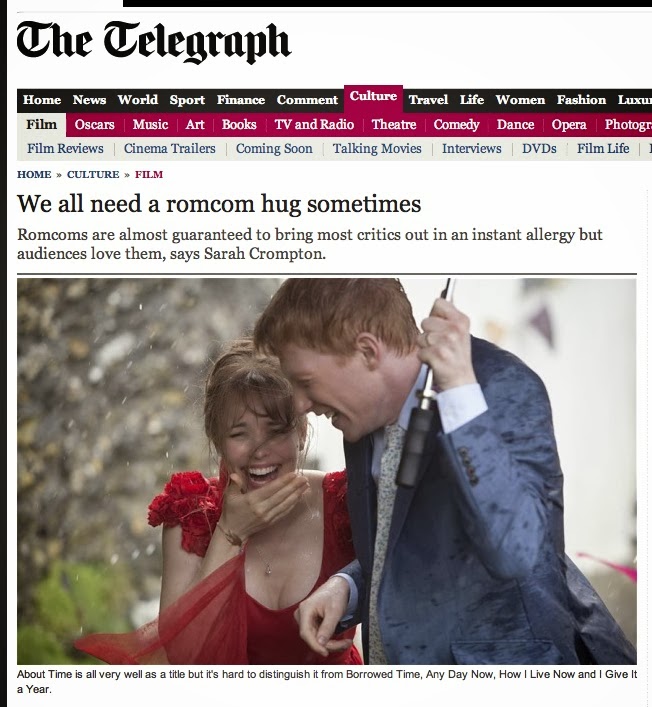The Guardian
This article shows that although rom coms often get thrashed by the critics the audience still enjoyed them, we felt this was important.
It's also the latest in a long line of contemporary romantic comedies – proving that no matter how progressive we imagine we have become, our dating aspirations remain rooted in centuries-old tradition.

The Guardian
This shows that Rom-Coms are popular with couples especially around valentines day. But now this is changing.
Reviews were scathing, but ensemble romcom Valentine's Day has finally ended.
Telegraph
Although critics complain sometimes there is nothing better than watching a rom-com. Although the formula is the same and can become repetitive and this is what the critics don't like, however for some people its the best thing - this is the audience we want to target.
I think it is this sense of how comforting movies can be that critics sometimes miss.
Watching About Time is like being given a big hug, and it is a very nice sensation.
Marley + Me ( a romantic comedy where everyone is in love with the dog) can reduce me to a helpless happy blubber, and every time Notting Hill is on television (which is surprisingly often) I find myself compelled to watch it, and even mire compelled to sob at the "I'm just a girl standing in front of a boy, asking him to love her" line. I know its corny, but it doesn't matter. It works its magic every time.
Romcoms tend to defy such rigorous critique.
Richard Curtis is the Mrs Miniver of our times, though rather wittier. His films fulfil the same function of making Britain seem a good place, full of nice people.
Romantic comedies seem to take over where the fairytales of childhood left off, feeding our dreams of a soulmate;
Now, hot on the heels of It's Complicated, Crazy, Stupid, Love offers further proof that the romcom, rather than desert we middle-lifers, has decided to mature with us. In the US, 64% of the opening weekend audience was female and 71% were over 25. Not that our aspirations have changed much, judging by this script. We still want our hero and heroine to convince us that a stroll into the sunset and beyond is the most likely outcome of initial adversity.
And it is still heroes and heroines we're talking about; despite homosexuality long ago entering the cultural mainstream, a single-sex relationship has yet to be the full focus of a mainstream romance, unless you count Brokeback Mountain where, I believe, the comedy was unintentional; or Mel Gibson and Danny DeVito. "When Harry Met Henry" and "When Sally Met Sarah" are long overdue, and this only confirms how conventional the rules of engagement are when it comes to the romantic comedy genre. Today's cinema audience may be more cynical (and sexually active) than that of our parents but they still demand that verbal foreplay lead to physical consummation, and misunderstandings to love with a capital L. In the world of the romantic comedy, life hasn't changed much since the 1950s.
Ironically for a movie category not renowned for its originality or inventiveness, it's the one arena where women have been allowed to be feisty way before feminism made it de rigueur.
Since so many romantic comedies vary little in their storyline, the success or failure of such movies depends largely on whether we believe in the relationship of the protagonists.
Back in the good old days, all a Hollywood studio had to do to make tens of millions of dollars was release a film about a plucky, satisfyingly flawed female protagonist who finds quirky but ultimately bland love with a chesty yet tender-hearted man. Meet-cute, But I Can't Stand Him montage, scene where Everything Changes, infatuation montage, misunderstanding that threatens to derail the whole thing, dramatic gesture to correct misunderstanding, satisfying resolution. Boom. A Rom Com. But over the last few years, box office receipts have been disappointing. Hollywood execs say that audiences are sick of romantic comedy tropes, that the formula is tired. But women aren't tired of the romantic comedy formula at all; what we're tired of is films made by people who don't understand what female viewers want. And we've finally got other options.
The problem isn't that audiences are bored or that technology ruined everything; the problem is that there aren't enough people in Hollywood who understand why women watch romantic comedies making movies — there aren't enough women. Last year, only 18% of directors, writers, executive producers, producers, cinematographers, and editors working on the top 250 grossing box office films were women, a 1% increase since 1998. That's fucking embarrassing. And women want to watch movies; the god-awful Twilight franchise has grossed over a billion dollars, a mostly-female audience is nerding the fuck out on The Hunger Games. Brave, Les Miserables, and Silver Linings Playbook kicked ass in the 2012 box office. There's a gigantic opportunity to snag more female viewers by simply releasing a halfway decent romcom that doesn't depict women as psychopathic brides.
The romantic comedy is very much alive. It just needs to be made by people who understand why the romantic comedy audience watches. Romantic comedies need to be made by ... women. And with an ever-growing class of talented and funny female comedy writers currently working in TV, maybe the next architect of the romantic comedy of Hollywood's dreams has been right in front of it this whole time. If they'd only notice.
Millions of girls turn 13 ever year. Even if people discarded film genres once they caught onto their tropes, studio execs could figure that they've got at least 3 solid years of earnest romcom viewing from most young women before they catch on to the fact that every film is the same.


No comments:
Post a Comment